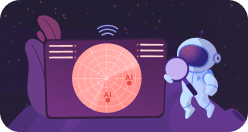ChatGPT, the OpenAI’s most talked-about and controversial creation, fueled many concerns about homework being made a thing of the past due to students abusing this highly trained language model for cheating and plagiarism. Some schools responded by outright banning ChatGPT from classrooms, while some embraced it and used it for personalized instruction.
Being usually optimistic about technologies, I believe ChatGPT can be an asset to every user, especially for learners – just as its creators intended. Here are some fun and creative ways you can use ChatGPT for studying and everyday chores that are still ethical and don’t break the academic honor code.
Improving your drafts
I wouldn’t trust ChatGPT to write my papers for me, but editing is quite another kettle of fish. You can submit your original draft to the chatbot and ask it whether everything looks okay from the grammar and spelling points of view. Yet it’s not all by any means! ChatGPT can do better than simply double as your word processor’s spellchecker. You can ask it general questions, for example, “How can I improve my essay?” or specific ones, like “Is it compliant with the APA style guide?” or “How can I make it more engaging?” You can also ask ChatGPT to propose a catchy title or attention-grabbing hook for your essay.
Ethan Mollick, an innovative professor at the Wharton School of the University of Pennsylvania, encourages his students to use AI assistance to improve their writing. He thinks that as long as the ideas and knowledge come from a student’s head, automated help is just leveling the field and prevents bright students from being penalized for bad writing in classes where it isn’t the central skill being taught.
ChatGPT is a great interactive tool you can use to work on your style and improve your drafts. However, don’t forget its limitations: despite the eerily human-like text-generating capabilities, it’s a linguistic model that works with stats and numbers and lacks an understanding of the words’ meaning. If you need editing of an important paper, such as your college application essay or thesis, better turn to a human you trust – an instructor or professional editor.
Summarizing long texts
When doing preliminary research for a paper, the most tedious and time-consuming part is sifting through the tons of material to understand which studies you can use for your research and which are irrelevant. ChatGPT can summarize long texts into several paragraphs or a list of key points to give you the gist of it. This way, you can assess the usefulness of the paper and whether it’s worthwhile to read it in full. This is very handy and can save you a lot of time, however, make sure you do read the articles that seem useful in full because the information might get distorted by the algorithm that doesn’t understand nuances.
Another application for this ChatGPT’s ability is summarizing long literary work into a single paragraph that you can use in your review. For example, if your book report or analysis must include a short synopsis of Shakespeare’s Twelfth Night, you can save yourself time by outsourcing recounting the convoluted plot to the algorithm and getting straight to your astute analysis instead.
Getting complex things explained
Akin to summarizing books and research articles, ChatGPT can give you the gist of any sum of knowledge. For example, you want to know what singularity is or how the grandfather clock works. Just ask ChatGPT. If it uses the term you don’t recognize, ask for an explanation. If you want the answer to be guaranteed accessible, add the phrase “explain like I’m five” or similar instruction.
I recently asked ChatGPT to explain string theory to me. What can I say? Rocket science is no longer rocket science! Explaining anything at the level the asker understands is actually what ChatGPT was conceived and designed for, so it’s the natural next step after Google and Wikipedia towards accessible knowledge.
Translation
The translation is another thing ChatGPT is good at. Of course, machine translation is not always a solution – you might want to wait for the official localization of the new book by your favorite bestselling author or things like that. But to get the information from the article published in a foreign media outlet or to understand the instructions for that mysterious K-Beauty product that your friend brought you from the trip to South Korea as a gift, ChatGPT does a smashing job!
Alternatively, it can translate particular phrases into a foreign language you are learning and chat with you to help you improve your skills. It’s a great help for a solo language learner, adding interactivity and feedback to your studying routine.
Programming and debugging
Being an algorithm, ChatGPT is very good at understanding machine code and programming languages. Being a linguistic model, it’s also good at processing human requests. This makes ChatGPT the most fitting interpreter between the two, rivaled only by highly skilled software architects. Of course, I doubt that ChatGPT will make human programmers obsolete any time soon. However, it can be successfully employed for basic coding solutions, especially if you are not well-versed in programming but need a custom script for some practical task.
If you are still a computer science student, you can ask ChatGPT to debug your code and suggest improvements. However, don’t make this handy tool your only tutor. Avail of professional knowledge bases and forums like StackOverflow and GitHub.
Making up quizzes and exam questions
You know how you study for the test, and then you need to verify how well you’ve retained knowledge, so you ask your classmate to quiz you on anything from the coursebook? ChatGPT can do that, only better. It can be as inventive, surprising, creative, and devious as your instructor, asking questions you don’t expect. This is a great way to test your knowledge and up your revision game, ensuring you come to the exam fully prepared.
Similarly, ChatGPT can train for a job interview. Just ask the chatbot to suggest interview questions for a position you hope for and rehearse your answers. They might not, of course, be the very same you will be asked at a particular company, but this training will give you the necessary confidence and some idea of what to expect.
Checking your legal documents
Judges, attorneys, and policy-makers have been experimenting with ChatGPT to help them with decision-making or drafting legal documents – and received positive results. Of course, the algorithm won’t replace humans for court rulings, but it helps to save time and optimize some of the most time-consuming processes. For example, a Massachusetts lawmaker Barry Finegold recently used ChatGPT to draft a bill regulating generative AI models. According to Finegold, ChatGPT is responsible for creating about 70 percent of what lawmakers needed when they wanted to draft this bill. However, it still required expert input to get it done all the way.
If ChatGPT is good for policy-makers, it should be enough to help a nonprofessional like you. For example, you can ask it to draft a hypothetical apartment lease agreement, marriage contract, or even your will. You can also submit a contract you want to sign to ChatGPT and ask whether everything is just and whether anything looks suspicious. It can warn you about any exploitative clauses that hide behind the obscure legalese.
Looking for things that Google can’t find
You can use ChatGPT as a handy search engine that looks for things you don’t know the name or keywords for. For example, you remember some movie you’ve seen once as a kid, but it’s not very popular, and no one seems to recall it. Just describe the plot as best as you can and let the ChatGPT suggest its best guess (usually entirely accurate) in response. Same with books, commercials, video games, or any other things you can think of. Today, it helped me find a whimsical music video I remember seeing on MTV as a very young child. Its creepy imagery of subverted suburban life stuck with me for years, but I didn’t remember the lyrics to Google it. ChatGPT found it in two seconds, based on my description.
Here is another example. I asked ChatGPT to find a skincare product based on my needs and customer reviews. When it came up with the suggestions, it looked good but a bit pricier than I would like, so I asked it to suggest a cheaper alternative and some home remedy options. I must say, it did a good job and saved me hours of scrolling through search results, reading product descriptions and ingredient lists, along with researching the properties of particular plant extracts and acids on healthcare websites. Of course, you should check if the advice ChatGPT gives you is indeed valid, but it makes the search process so much faster!
Planning your travel
Of course, ChatGPT is not a travel agent, and it cannot book your flights and inform you of the availability of rooms in hotels. Its access to information has time cutoffs and is not current. However, it can help you plan your itinerary for, say, a week’s trip to Spain or brief you on the must-see locations in India. You can even use it to find exciting destinations based on your preferences and abilities. The best thing about ChatGPT as a travel consultant is that it’s free, so you can ask it over and over until you find the perfect match, and it doesn’t have any agenda of its own, like selling that last-minute package tour while bookings are still valid.
On the downside, you will have to work out the details yourself, taking into account all the latest real-life developments, like quarantine restrictions, local conflicts, flight availability, and other things that might influence the possibility of travel.
Pastime recommendations
If you are bored and don’t know what to do, ChatGPT can suggest pastimes for you. Games to pass the time during long car trips, ideas for theme parties, fun activities for sleepovers, games to play in the pool with friends or your roommate when stranded at home on a rainy afternoon. Specify the number of people, location, equipment, and other relevant conditions.
Granted, the need for such things often arises when you suddenly lose internet connection or your device battery dies, so you cannot access ChatGPT with the request to help you, but that’s another case demonstrating the value of good planning! Ask ChatGPT for suggestions before you go on a trip, arrive at a sleepover, etc. and be the soul of the party!
From chatting to working with your datasets through customized APIs to produce fine-tuned results for any purpose under the sun, it seems there are no limits to what ChatGPT can do. It is indeed a groundbreaking model, and there are myriad ways you can use it every day to enhance your learning and save time. However, the results such models produce are only as good as the data they are fed, so don’t expect it to have an answer to everything. Try it out, but take care before following its advice, especially legal, financial, or medical. Some things are still better left to humans.










